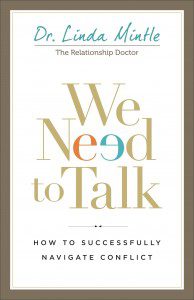 Jim and Rachel are at it again. They can’t seem to agree on so many issues and all the fighting is taking a toll. Like so many of us, this couple needs help navigating conflict in a way that grows, not destroys, their relationship.
Jim and Rachel are at it again. They can’t seem to agree on so many issues and all the fighting is taking a toll. Like so many of us, this couple needs help navigating conflict in a way that grows, not destroys, their relationship.
“We need to talk . . .”
It’s amazing how these four short words can stop a conversation and grip us with momentary anxiety. Let’s be honest, these words usually mean something is wrong and we are about to go into the world of feelings, a place not everyone likes to visit. If you are smart, you won’t begin a conversation with these four words. The phrase “We need to talk” puts most of us on the defensive.
“We need to talk” takes time and energy. It can be exhausting and doesn’t always end with a quick fix. But the idea behind “We need to talk” is important to making our relationships work. It’s our cue that something needs to be addressed.
How do you respond to these four words? Take the free conflict style assessment to find out. Do you embrace the idea or run for the hills?
One reason this phrase makes our hearts skip a beat is because so many of us are uncomfortable working through relationship conflicts. For whatever reasons, we don’t have the confidence that we can face conflict without causing more problems. And we don’t like the way conflict makes us feel.
But conflict is woven into our daily lives. It shows up often—in political arguments, disagreements with co-workers, fights with siblings, and marital bickering. Its consequences can bring the end of a marriage, friction between friends, or loss of a job. Thus, this ever-present conflict can keep us stuck or it can provide growth in our relationships. To deal with conflict, we do need to talk.
Conflict is a part of all close relationship. Under the right conditions, conflict can grow intimacy and bring satisfaction to relationships. And in unhappy relationships, conflict escalates problems and distress and needs to be addressed.
Conflict is difficult to handle because it involves other people, and we can’t fully control other people. While that reality makes us uncomfortable and complicates things, we do control our part in any conflict situation. Our reactions matter when we need to talk. We focus on the part we control, not on what someone else is doing or not doing. This shift in focus is critical.
In the best of situations, confronting conflict brings positive results. Relief is felt once the issue is addressed. We learn more about ourselves and more about others. We see that relationships can be repaired, people can reconcile, and problems can be solved. A deeper understanding, closeness, and mutual respect can develop when we do talk.
Dr. Linda Mintle’s book, We Need to Talk is now available.


